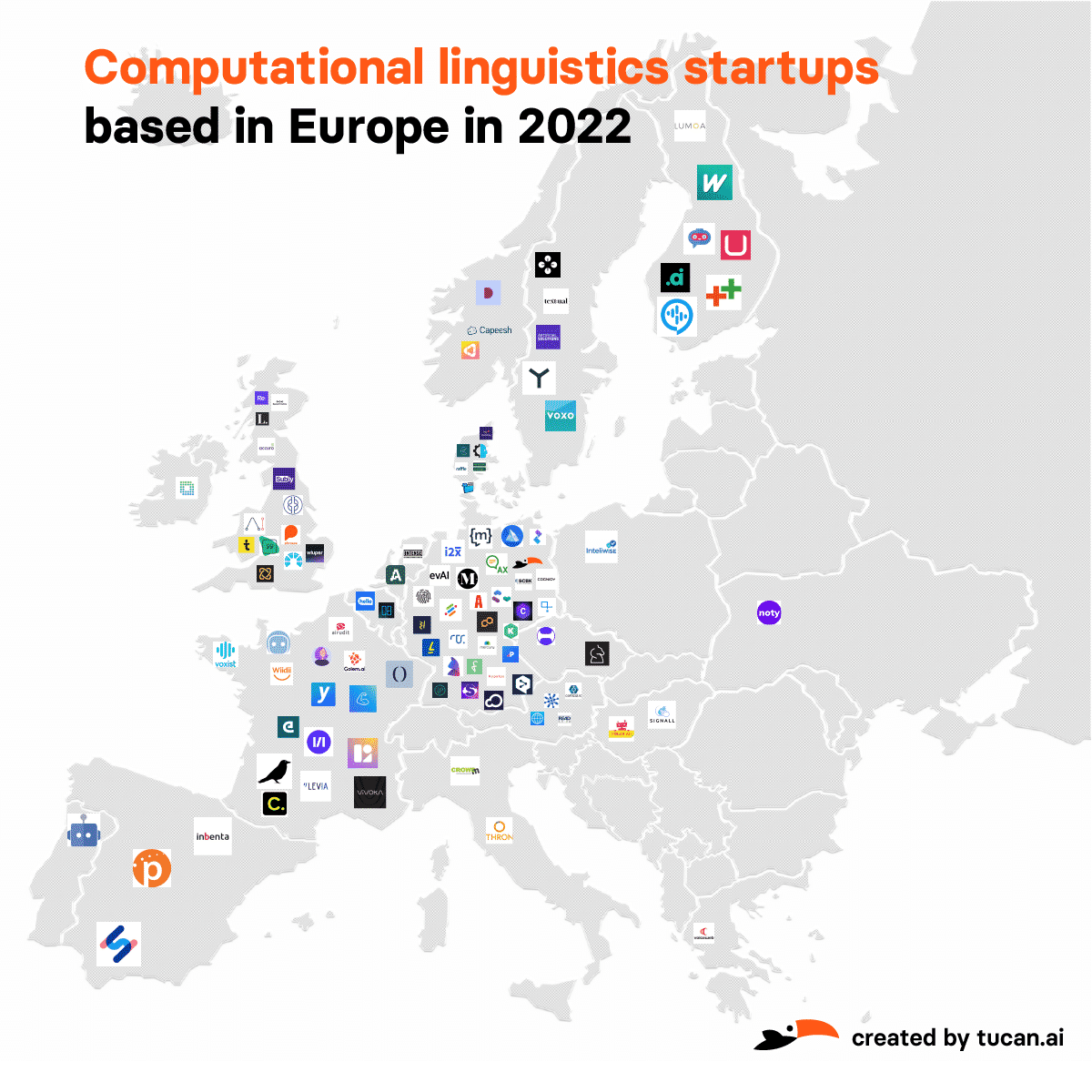
No doubt. We are in the midst of a digital revolution. Since ChatGPT’s release a few months ago, large language models (LLM) and natural language processing (NLP) have been on everyone’s lips. But there are already many more useful tools other than OpenAI’s wunderkind out there. Continue reading to dive deep with us into the world of computational linguistics (CL).
As a startup specialised in AI and CL, we at Tucan.ai experience and drive the impact of AI on our daily lives firsthand, both as a user and a developer. Despite deteriorations in the investment climate, methods of NLP and machine learning (ML) are greatly redefining our ways of using computers and language. This is shown, for example, in the still growing number of CL startups across Europe.
We took this as an occasion to create a comprehensive landscape overview of young European tech companies in the wider CL and NLP scene. Thanks to the help of our LinkedIn community we finalised the research project last week.
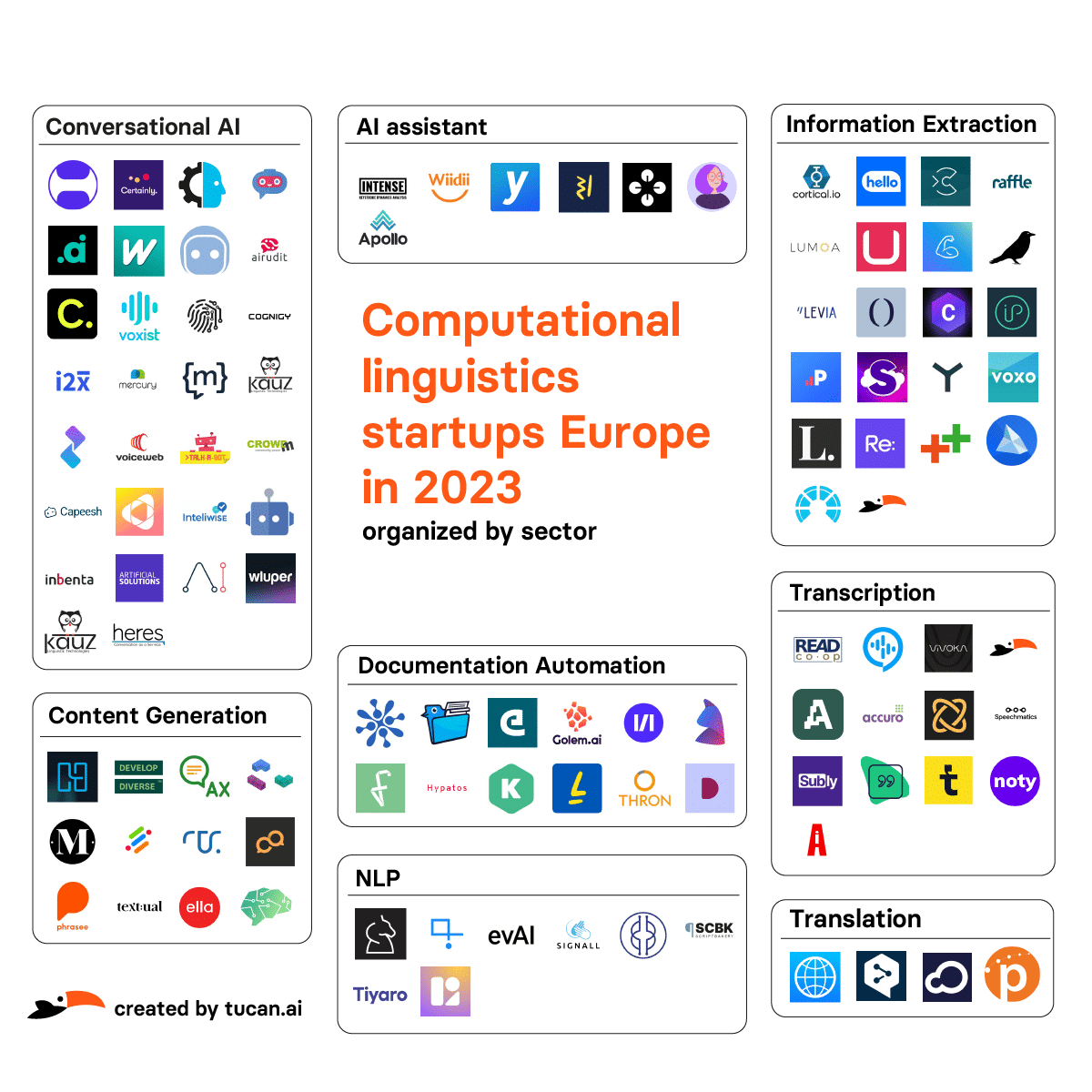
We tried to categorise CL startups according to their specialisations and core products.
Technical expertise, entrepreneurial spirit and customer focus are generally deemed the most important characteristics of successful tech startups. A deep understanding of the field and the ability to apply this knowledge to create new and innovative solutions are essential to stand out in the CL scene.
Young companies also must be willing to take risks and pursue unconventional ideas, even in the face of uncertainty and ambiguity. Plus, focus on customers to create solutions that actually meet people’s needs is important. This requires listening to feedback and being flexible enough to pivot and iterate based on it.
Let’s now take a closer look at the various CL subfields and product niches and a few of the most promising players that have emerged across Europe. We tried to categorise them according to their specialisations and core products.
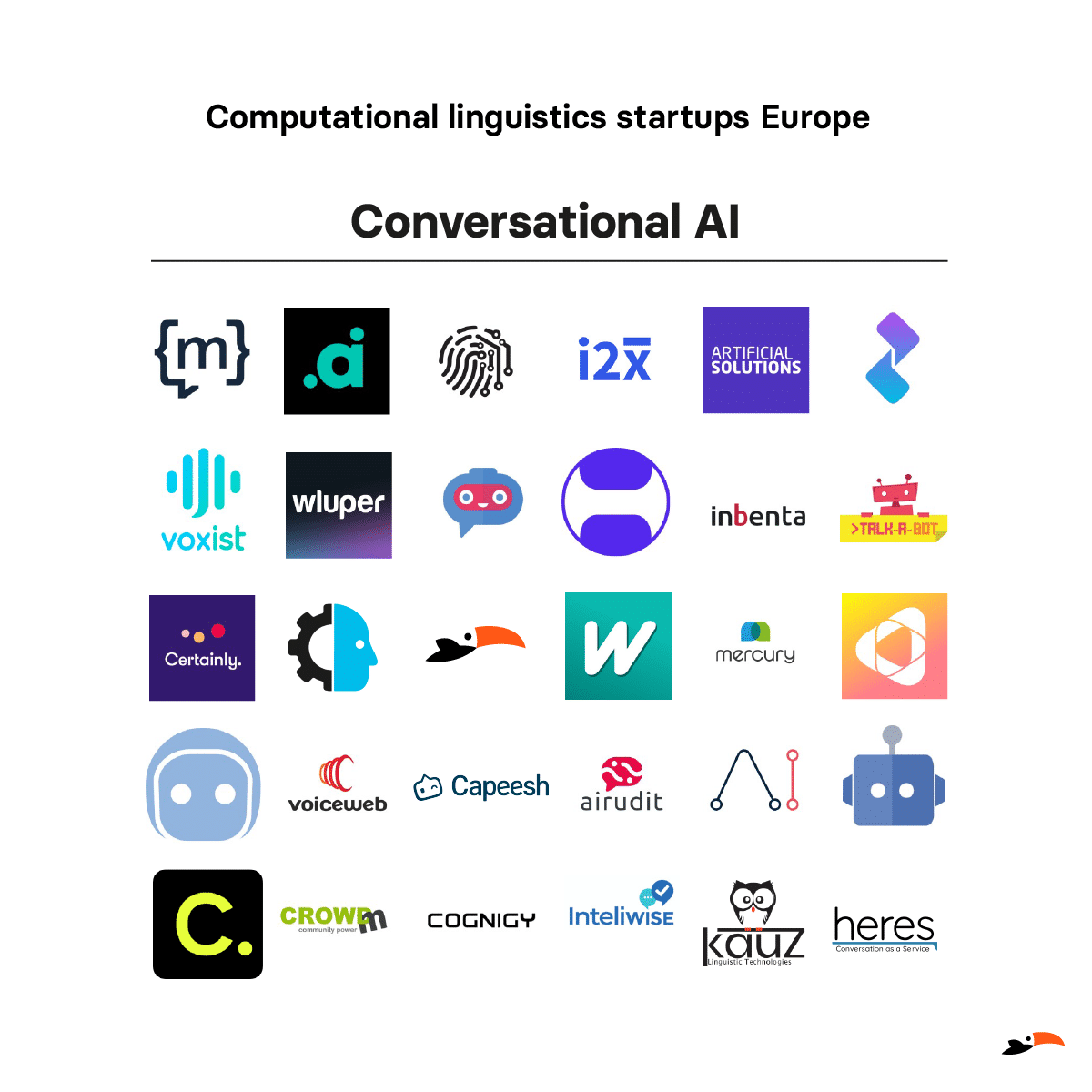
Table of Contents
ToggleConversational AI
AI engines allow people to interact with machines more naturally and intuitively by using voice or text input. Startups in this category develop products or services with one common goal: to make access to information easier and improve service experience with more human-like and personalised approaches.
Some of these companies focus on building chatbots that are integratable into already existing platforms liking messaging apps and websites. Others develop virtual assistants that can be accessed through voice or text commands, using AI and machine learning technologies such as voice recognition and NLP.
-
ko-bot – personalised chatbot for social media
-
Talk-A-Bot – enterprise chatbot provider for automating communication
-
InteliWISE – automation of chats for customer service, marketing and sales
-
Certainly.io – “a digital twin of your best sales person”
-
InDialog.ai – chatbot to improve CX knowledge and management
-
Elias Robot – language learning solution for English students
-
Front AI – AI-based customer service bots
-
WordDive – app for learning languages
-
Airudit – Voice AI technology
-
Botmind – e-commerce customer support automation
-
Clustaar – chatbot and SEO optimisation
-
Voxist – transforming data with voice
-
Charles – revenue and branding for WhatsApp
-
Cognigy – levelling up enterprise contact centres
-
I2x – collaboration of human and AI for common good
-
Mercury.ai – chatbots for customer service
-
moinAI – chatbot for customer conversations
-
Zana Technologies GmbH – conversational AI for the healthcare industry
-
VoiceWeb – speech processing technology and UI provider
-
CrowdM – chatbots for marketing performance
-
Capeesh – teaching foreign staff new languages
-
Cavai – conversational advertising platform
-
Visor.ai – platform for service interactions without coding
-
Inbenta – online self-service and conversion with AI and NLP
-
Artificial Solutions – provider for SaaS platform Teneo
-
EBI.ai – AI assistant platform
-
Wluper – voice user interfaces
-
Kauz – automatisation of help desks and customer service
-
Heres – “conversation as a service”
Did we miss any startups? Suggest new ones here and we will consider them in our next update!
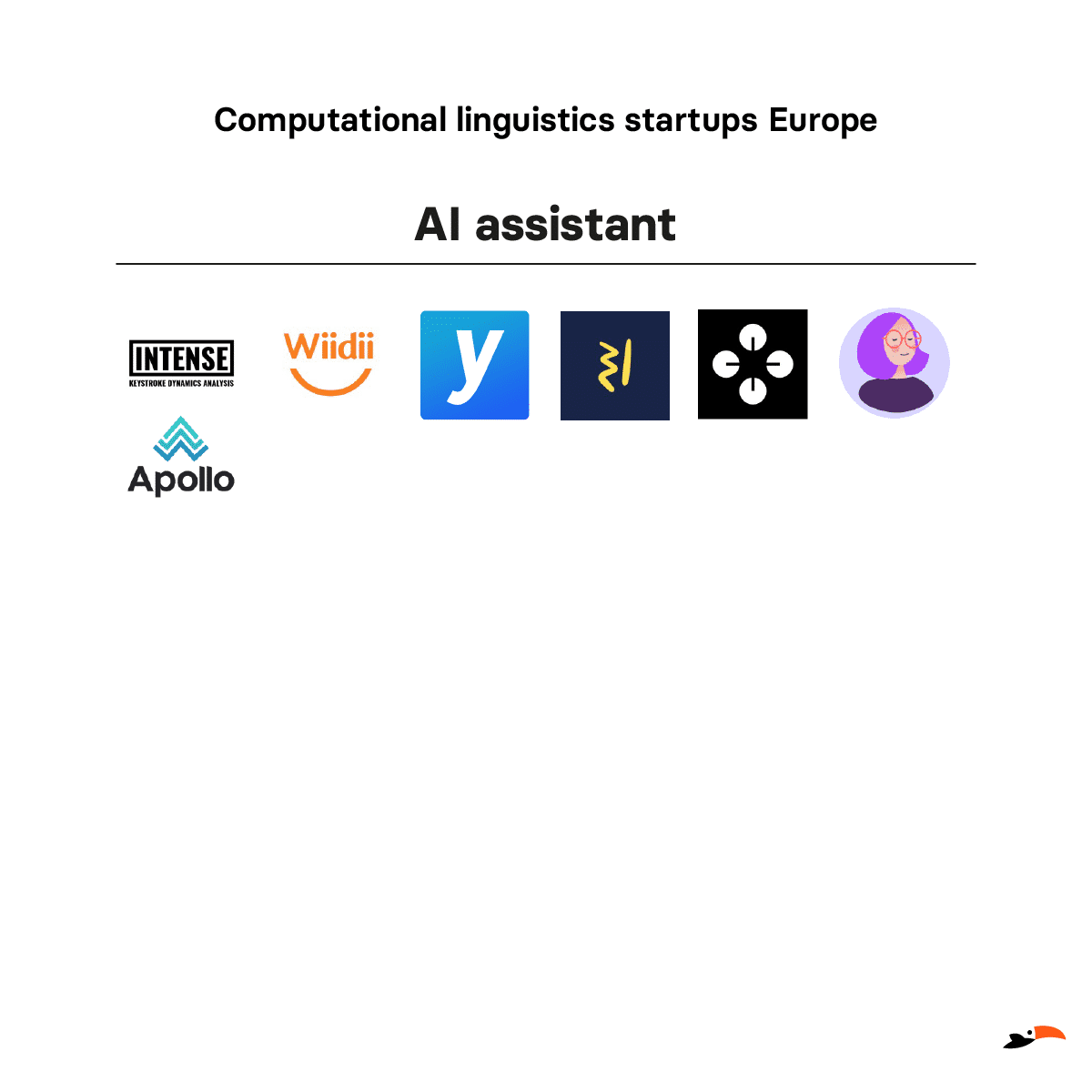
AI Assistants
Speaking of, virtual assistants, also called AI assistants, can be handy helpers in managing your tasks. Whether as bot, app or API, they assist you in figuring out and managing how to use your time more efficiently, prevent unnecessary work – et patati, et patata.
As a user: You can give a text or voice input and the assistant responds to you with clear advice on what to do next. For your work life: You can get guidance for managing your emails, social media, internal communications or campaigns.
In response to the Corona pandemic, demand for AI assistants has skyrocketed. AI-powered assistance tools such as those from IBM or the French meeting and agenda management assistant JulieDesk help professionals automate and optimise analytics and operational processes.
Some virtual assistants can for instance pre-select queries and automatically answer frequent ones with the help of scripted rules. They continuously learn new answers to routine questions through integrations with backend systems.
In the Netherlands, Intense Solutions caught our eye due to their innovative approach towards AI and NLP to develop algorithms which automate tasks and processes like predictive analytics and sentiment analysis.
The Dutch startup had the idea to develop software that helps companies assess if their employees are at risk of burnout and if implementing tools for prevention is necessary. Intense Solutions’ tools can be integrated into existing systems to provide actionable insights.
-
JulieDesk – a virtual assistant collaboration team for managing tasks
-
Wiidii – AI solution for communication and emotion detection
-
Personio – all-in-on HR solutions
-
Intense Solutions – “keyboard of the future”
-
Sana Labs – AI-powered learning platform
-
Apollo.ai – software for meeting management and decision-making
Did we miss any startups? Suggest new ones here and we will consider them in our next update!
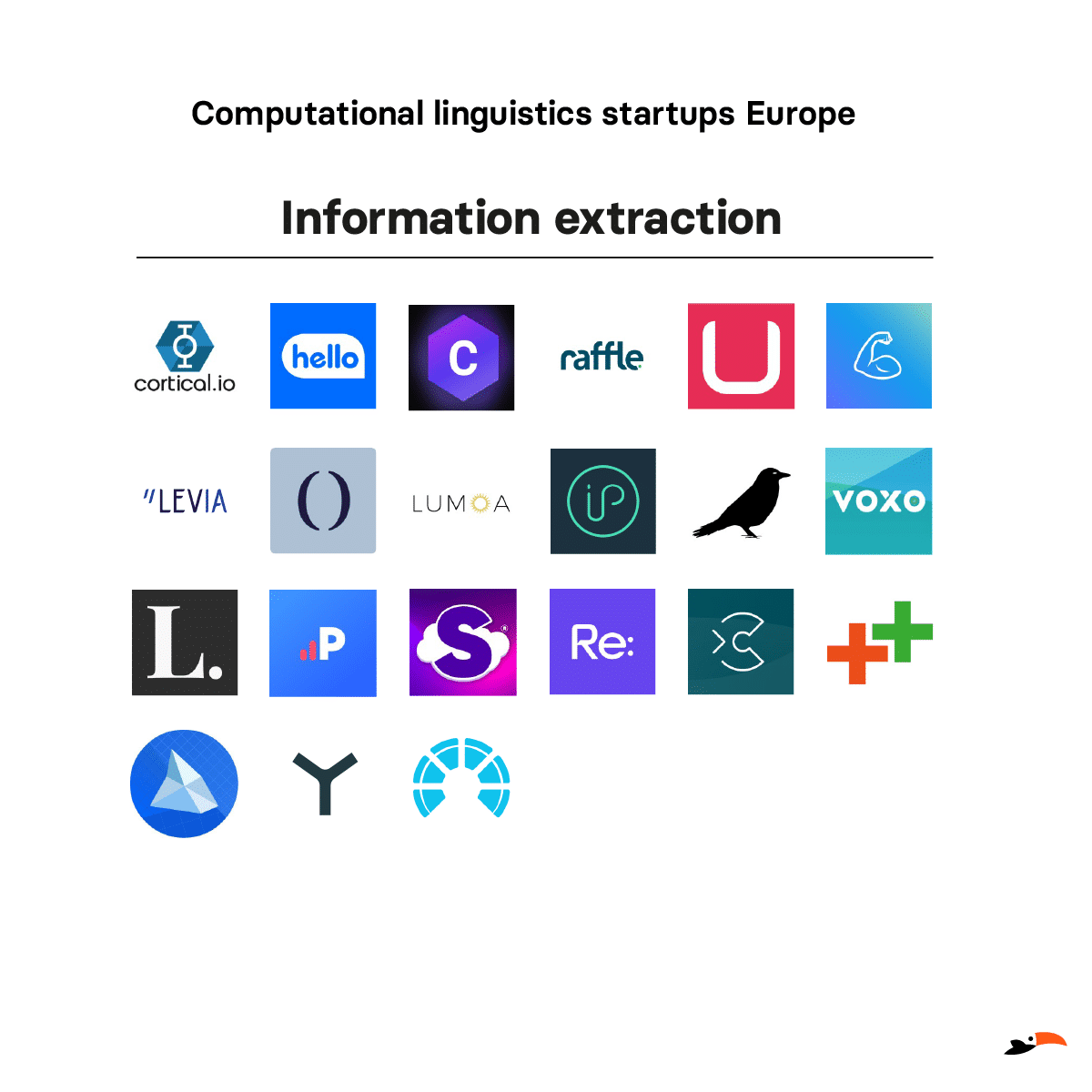
Information Extraction
Information extraction is the process of extracting structured information from unstructured data. The technology is based on NLP or/and NPU. It helps you find and collect the most valuable data for your project or company by automatically analysing various data sources.
Thanks to intelligent information extraction tools we are now able to sift through text documents (even handwritten ones), websites or social media platforms and find the data you need more quickly and easily.
To give an example and beat the advertising drum a bit for ourselves as well: While the AI-powered platform we have developed at Tucan.ai is build around in-house speech-to-text algorithms that are specialised in accurate transcription of unclear speech, it is also able to automatically extract, encode and summarise specific information from conversations, audio and text files.
-
Cortical.io – document processing solution
-
Hello Customer – AI-powered customer feedback analysis
-
Capturi – analyzing customer conversations
-
Raffle.AI – search engine which mimics human behavior
-
AISpotter – cloud-based video analysis and production service
-
Lumoa – guide for business growth
-
Utopia Analytics – machine learning service
-
Bodyguard.ai – moderation solution for detecting toxic content
-
Crowlingo – monitoring platform powered by Deep NLP
-
Levia.ai – turning knowledge into smart tools
-
Opsicidia – increasing diffusion of research results
-
Creatext – AI sales platform
-
IPlytics – great solution for patents and standard contributions
-
Lateral – solution for reviewing documents
-
Pyoneer – customer feedback analytics
-
Semantha – speeding up documentation processes
-
EdgeTier – analytical product and service for customer contact centres
-
Layke Analytics – tool for searching candidates
-
Voxo – actionable insights from conversations through voice data
-
Chattermill – customer intelligence platform
-
Logically – tracking harmful & problematic online content
-
Re:infer – conversational data intelligence platform
-
Tucan.ai – automatic information extraction from conversations
Did we miss any startups? Suggest new ones here and we will consider them in our next update!
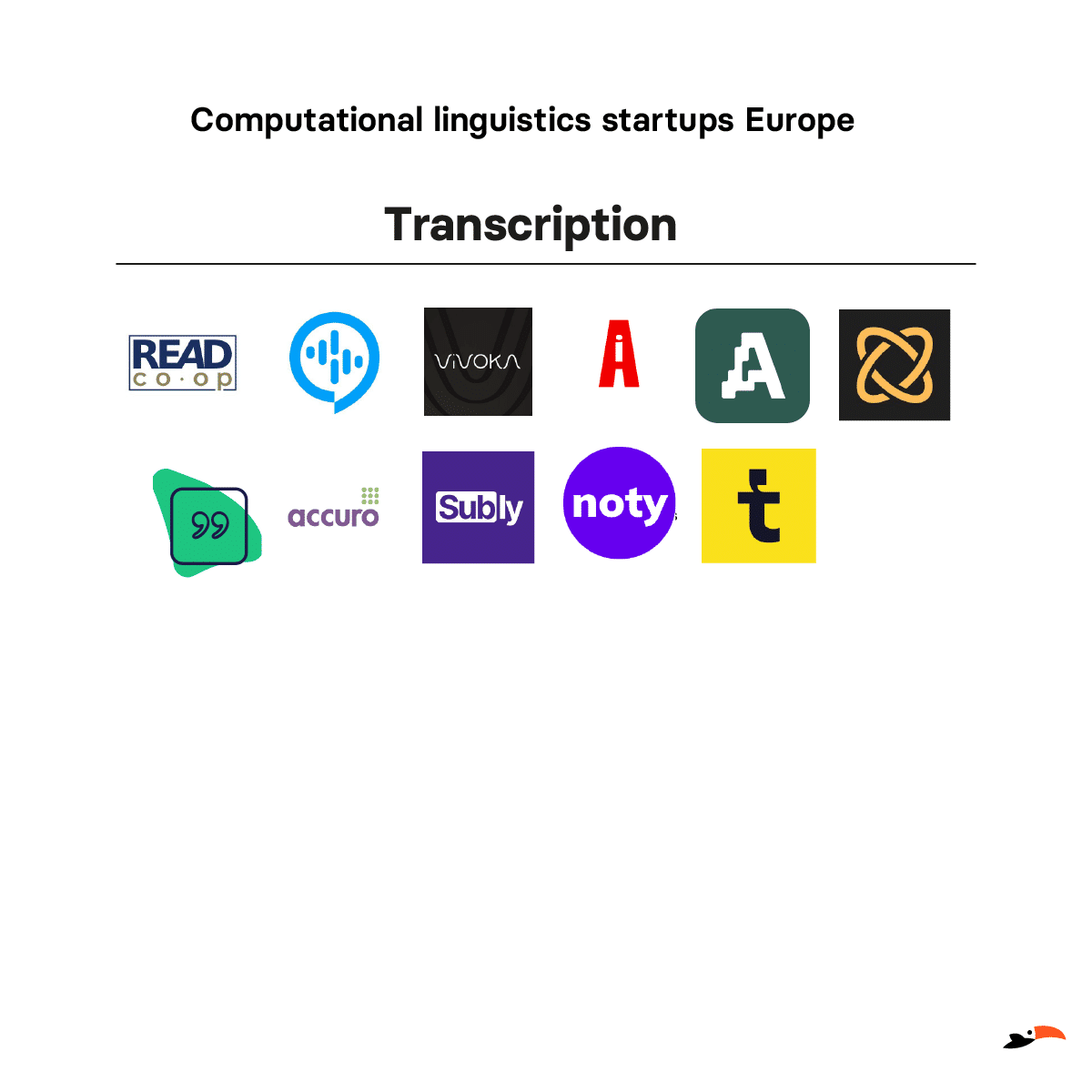
Automatic Transcription
Manual writing and typing is exhausting and time consuming and often leads to miscommunication and loss of information. AI-powered speech-to-text tools are able to take over tedious transcription, documentation and research tasks.
With Tucan.ai, which is developed in Berlin and Vienna, you can save up to 80% of your committed resources, focus and energy. As briefly mentioned above, the platform transcribes, encodes and summarises interviews, calls, meetings and other conversations to help analyse and manage them, or simply put: to find and extract meaning in one click.
You want to test Tucan.ai for your Company?
Book a free consultation call!
-
READ coop – accessing archival documentd
-
Noty – transforming meetings into actions and follow-ups
-
Speechly – automatic speech recognition
-
Vivoka – adaptive personal voice assistant
-
Aiconix.ai – analysing and processing audiovisual content
-
Amberscript – “transforming audio into text”
-
Happy Scribe – transcription and subtitle platform
-
Accuro – AI-driven speech-to-text services
-
Alchemy Machines – conversation intelligence for legal
-
Speechmatics – top-knodge speech-to-text API
-
Subly – automatic subtitles and translations
-
Take Note – secure transcription services
-
Trint – speech-to-text platform for audio and video search
-
Tucan.ai – AI-powered transcription, summarisation and archiving
Did we miss any startups? Suggest new ones here and we will consider them in our next update!
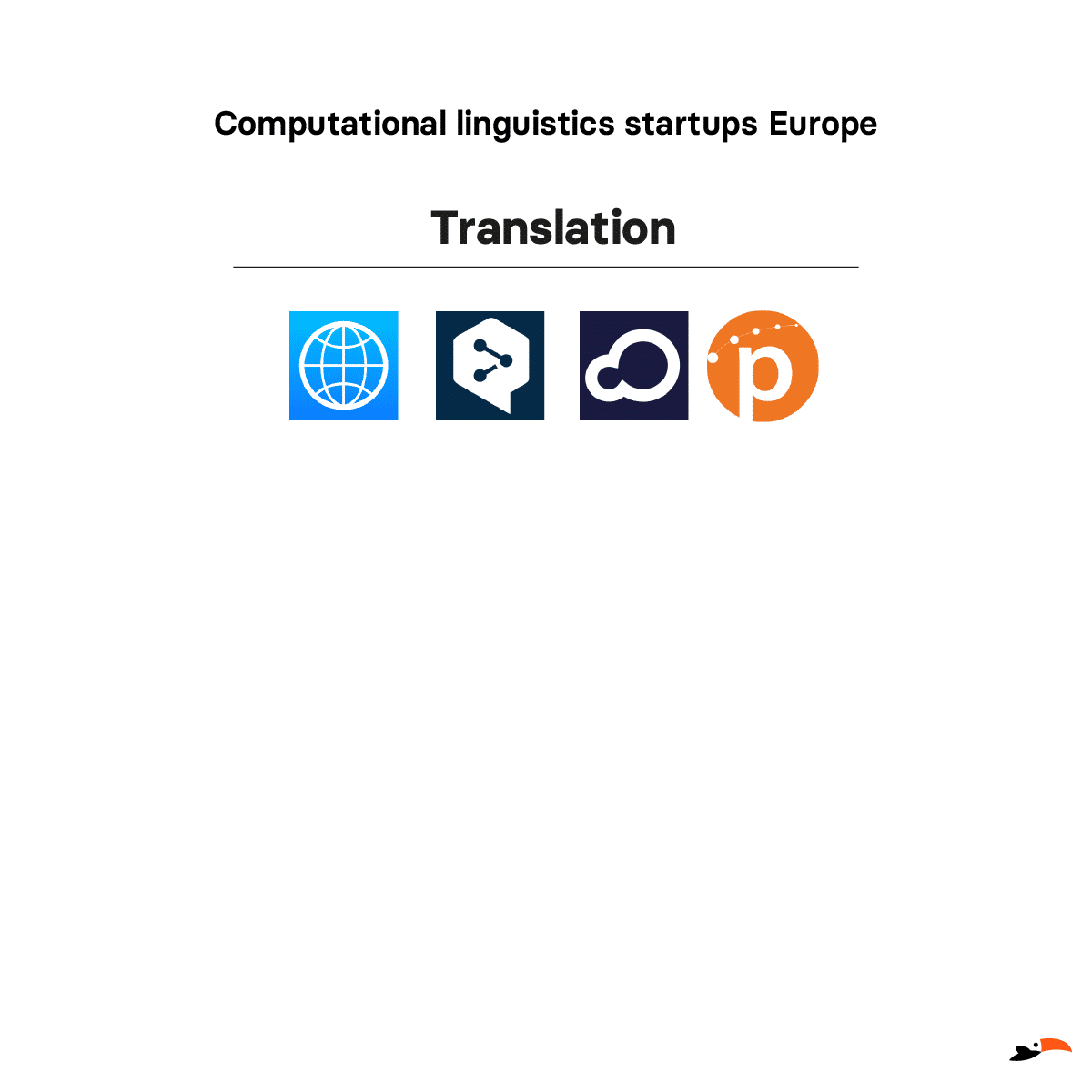
Automatic Translation
Making the process of translation easier, more accurate, and faster are the goals of AI translation startups. From translating one language into another digitally, you now can save a huge amount of time and also deal with large volumes of content, such as websites, marketing materials or technical documents.
One of the most well-known CL startups today is DeepL, based in Cologne. This startup is currently the most accurate translator on the market. In blind tests conducted in 2020 and 2021, the quality of their translations was compared to that of their competitors such as Google, Amazon and others. According to the study, they are on average three times more accurate.
With over 1 billion users worldwide, DeepL’s popularity is undisputable. But their success story doesn’t end here: The startup has recently become a unicorn after a fundraise at the valuation of 1 billion US dollars.
DeepL uses advanced neural machine translation technology, providing highly accurate and natural-sounding translations compared to traditional methods. With access to vast amounts of diverse training data, it can accurately translate a wide range of language pairs, also with complex grammar and vocabulary.
-
iTranslate – translation and dictionary app
-
DeepL – real-time AI translation
-
Lengoo – machine translation systems
-
Pangeanic – translating and anonymizing content
Did we miss any startups? Suggest new ones here and we will consider them in our next update!
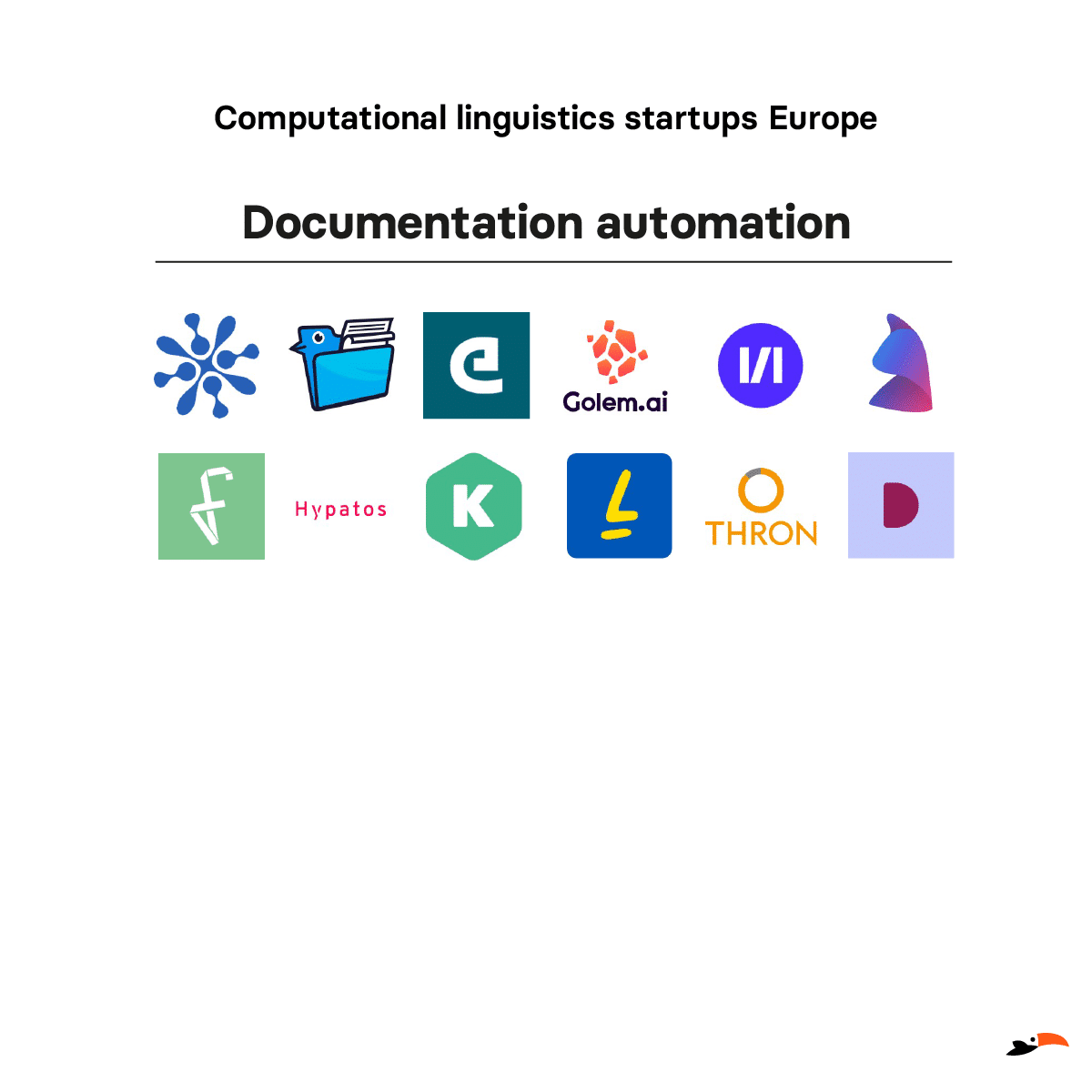
Document Automation
Startups in this field create, organise and manage your documentation. Added to that, they also work on algorithms which understand and interpret different types of content, such as text, images, and audio. Documenting your process in the company is essential to get valuable insights and a deeper understanding of your customer’s behaviour and needs.
For example, DeepOpinion is an AI-powered platform that specializes in analyzing and extracting insights from customer feedback. They use NLP and machine learning techniques to help businesses gain a deeper understanding of their customers’ opinions and preferences.
The platform can analyze customer feedback from a variety of sources, including social media, online reviews, surveys, and more. It then provides businesses with actionable insights and recommendations to help them improve their products, services, and overall customer experience. The goal is to help businesses make data-driven decisions and create closer connections with their customers.
DeepOnion is being developed in Tyrol, Austria, and aims at being able to dock onto systems such as SAP, Salesforce, Twilio, Microsoft Dynamics or Zendesk, so that the AI can do its work there. It aims to automatically read and distribute mails, create service tickets and process incoming documents like invoices and delivery notes, all tasks human employees usually get bored with very quickly.
-
hello customer – AI-powered customer feedback analysis
-
DeepOpinion – automation for text and document processes
-
Archii – identify and manage GDPR risks automatically
-
EMVista – text analytics for decision-making
-
Golem.ai – automatic processing of messages
-
reciTal – AI-driven editing software
-
Curiosity – search engine for all your apps
-
Fileee – documentation management for business and private
-
Hypatos – deeplearning technologies for automating document processing
-
Konfuzio – document automation platform for professionals
-
Levity – automation for routine tasks with images, texts and documents
-
THRON – digital asset management platform
-
Documaster – automatised document management
Did we miss any startups? Suggest new ones here and we will consider them in our next update!
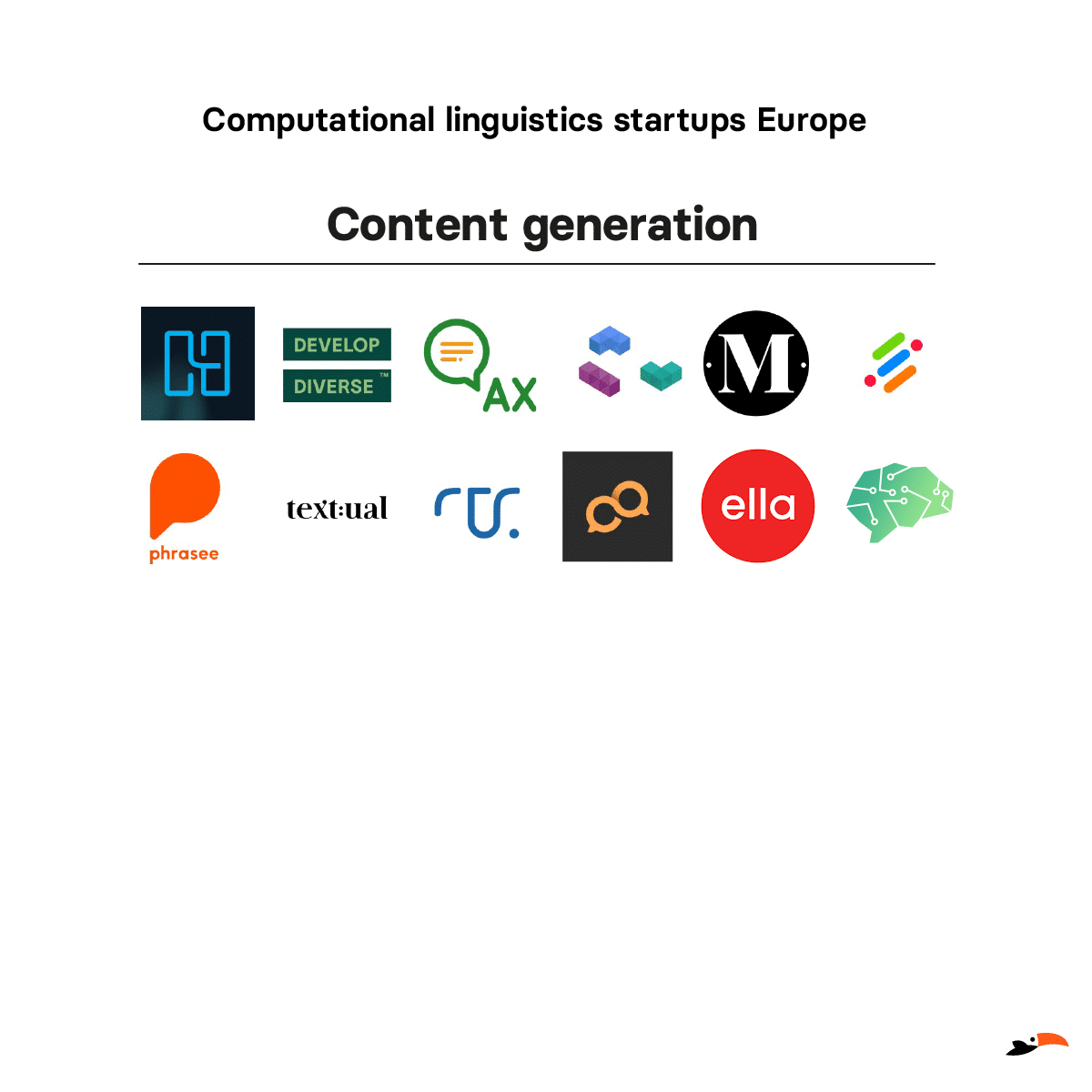
Content Generation
Automatically generated written texts are now possible with AI. Those startups can generate different types of texts for you to improve your workflow, and your writing skills, and help you to save time.
It will probably still take a while until writing tools perform at a human writing level, since it is difficult to reproduce human creativity, emotional and strategic thinking, but the technology is getting better and better at imitating these behavioural aspects. For now, however, AI-powered content generation should be understood as partial supplement or handy helper, rather than a replacement for human writing skills.
The Hamburg-based startup NeuroFlash develops an AI-powered platform that specialises in providing data-driven solutions to help businesses improve their operations and customer experience.
It uses advanced data analytics, ML and NLP to analyse large volumes of data from a variety of sources such as customer feedback, social media and other business metrics. NeuroFlash’s solutions can be applied to various industries, including retail, hospitality and healthcare.
-
Henchman – drafting contracts
-
Develop Diverse – “building diverse and inclusive workplaces”
-
AX Semantics – automatically text generation in 110 languages
-
Flowshot.ai – scalable AI flows for text-based tasks
-
Mindverse – virtual marketing expert for AI
-
neuroflash – writing tool for German texts
-
Retresco – automatically generating texts
-
Twyla AI – chatbots for designing conversations
-
Textual – scalable content creation for e-commerce
-
Phrasee – automating marketing messages
-
Ella Media – AI-generated storytelling
-
SageWrite – “AI-powered academic productivity”
Did we miss any startups? Suggest new ones here and we will consider them in our next update!
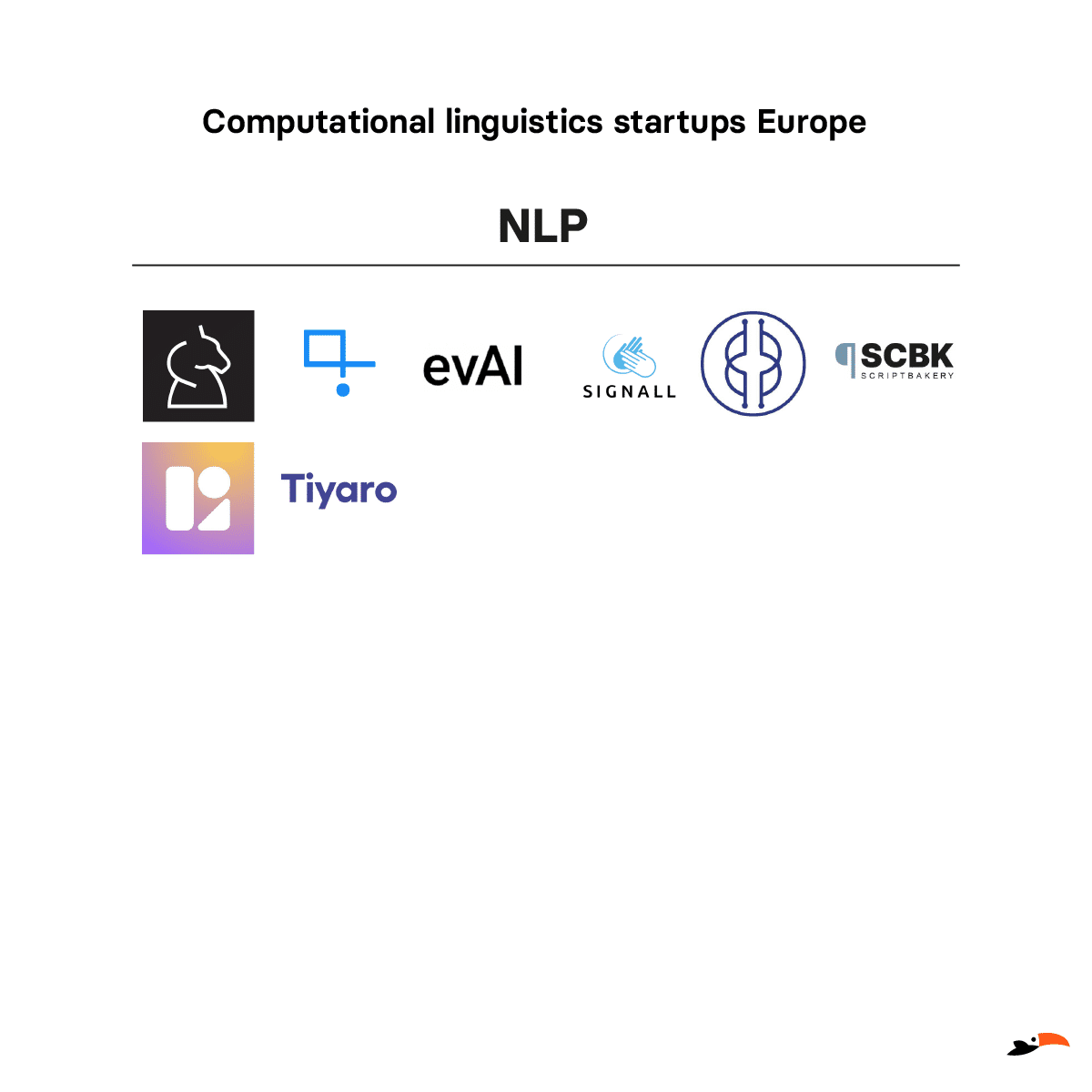
Natural Language Processing
NLP-specialised startups are companies that focus on developing technologies that help others to automatically process and understand human language.
These startups often use machine learning and other AI techniques to create products and services which can analyse text, speech, and other forms of human language. Some popular applications include NLP models for sentiment analysis, language translation, voice recognition and chatbots.
Over the past years, multiple NLP tools which use algorithms to log and analyse conversations, or even interpret them automatically, have been presented. So, there is more out there to discover than LLMs like GPT3 and GPT4. Much more.
NLP methods and systems for speech recognition and conversational intelligence each have their clear strengths and weaknesses, but when used in a targeted and combined way, they can already deliver a great deal of added value.
The fastest growing area is Automatic Speech Recognition (ASR), which converts spoken words into text. These systems work very precisely and are therefore ideal for tasks such as speaker attribution, logging and transcription. However, when it comes to recognising multiple speakers in noisy environments, as well as accents and dialects, some still have their difficulties.
Another innovative NLP element is Natural Language Understanding (NLU) systems. It goes beyond the transcription of words and tries to determine the meaning behind them. NLU is ideally suited for mood analysis, coding and intention recognition, for example. However, training is usually extremely complex because it requires large amounts of meticulously coded speech data.
Finally, there are systems that allow programmes to have an informative conversation with a human. Virtual assistants can automatically collect data, generate speech and give personalised answers, but usually still find it very difficult to correctly classify subtle forms of speech such as idioms or sarcasm.
-
SentiSquare – tailor-made AI for customer-generated text
-
SignAll – enabling communication between deaf and hearing people
-
Deepset – building open source search systems
-
evAI Intelligence – “putting data into context”
-
Scriptbakery – perceiving and finding of media content
-
NeuralSpace – accurate speech and text API
-
Tiyaro – evaluate, use and customise your AI
-
Lettria – allround NLP platform
-
Feelingstream – “stop losing customer service”
Did we miss any startups? Suggest new ones here and we will consider them in our next update!
Please note that this article is only intended to provide an initial overview of the myriad of new players, tools and opportunities that have recently emerged in the CL and NLP scene in Europe. There are perhaps still numerous other great startups and applications out there that are equally worthy of your attention.
If you know any you want to bring to our attention or in case you have questions about this article, we would love to hear from you.